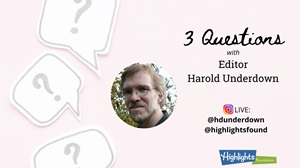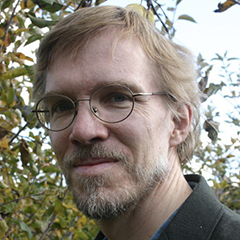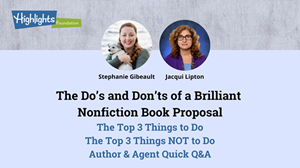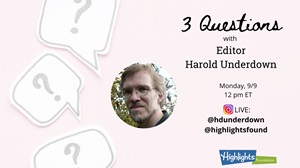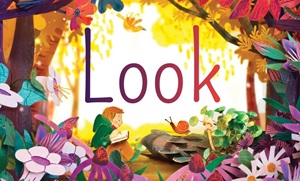Harold Underdown joined Highlights Foundation Social Media Manager Cat Galeano on Instagram Live to talk about The Crash Course in Children’s Book Publishing.
Watch the conversation below. (Please note: closed captions are being added to the video below. When they are finished, you can see them by hovering over the bottom of the video and choosing the “CC” icon.)
Full Transcript:
Cat:
A big hello to our Highlights Foundation family. We’re so happy to have you here with us. For those that may not know me, Hi! I’m Cat Galeano, my pronouns are she/her. I’m the social media manager at the Highlights Foundation, joining you from Westchester, New York on the traditional lands of the Seewanoy people. Apart from all the fun things I get to do at the Highlights Foundation, I am also a writer and a reader who is very excited to welcome our friend and faculty, Harold Underdown, who will be teaching the upcoming multi-week course: The Crash Course in Children’s Publishing, Spring Edition with special guests Leah Henderson, Linda Epstein and Pamela Courtney.
Crash Course kicks off April 16th, but before we dive in, I just wanted to remind our viewers that joining in on any Highlights Foundation sessions, to do so with no hate, no harm and no harassment of any kind. And now let’s get started. So my first question for you, Harold, is: children’s publishing is in an interesting era right now, isn’t it? Why is it important now more than ever, to have a foundational understanding of this industry before you start preparing and submitting and everything else?
Harold:
So there there’s a few parts to that question and and let me, let me kind of unpack that. From my experience–and I’ve been working in publishing for more than 30 years now–it, it has ALWAYS been important to know how the business works. And that begins with everything from the different kinds of children’s books. A lot of people come into this, only a vague idea about the really the, the complexity of the different areas of children’s books and and how, how they connect to children.
But that’s just the start. You need to understand the process of writing from a practical point of view. Like how to get feedback, not just sitting down and writing at your computer and knowing when you’re ready to send a manuscript out. The process of doing that; what happens later? What happens if a publisher or an agent is interested and what happens eventually when you get to the point of being offered a contract? And then on beyond that. How, how are you gonna actually be working with a publisher. That’s, that’s always been really important knowledge that often is kind of kept, you know, not kept out of the conversation, but the focus is very much a lot of the time in our business on,, on, on the writing and on the illustrating and you really have to put both of them together and and that’s what I’m slways aiming to do in the Crash Course now.
Now more than ever, I would say you know what’s happened is partly due to the pandemic. Partly just to the gradual evolution of publishing as a business. Which it is. It’s even more competitive. It’s even more difficult than, frankly, than it always has been. And you really don’t want to put yourself at a disadvantage in your career. You want to know the things you need to know to move forward and and that’s what we aim to offer across the weeks of the Crash Course.
Cat:
It’s really important to have that foundation, like you said. So we really encourage you to take a look at the page and, and really figure out if this is the right, if you want to take a kind of dive into this pool, which this is the, the perfect place to kind of start. Uh, so…
Harold:
Yeah, sorry. I just wanted to jump back in. It’s a lot of information that we offer and and you really should be sure that you’re, you’re ready to spend the time; it, it’s, it’s a fairly demanding course. I will, I will acknowledge that.
Cat:
And,and you do have extra time to rewatch the content, of course. But like Harold said, it is like if you want, if you decide you know what? I’m going to commit to this, like please commit to it because like Harold mentioned, it is a demanding course. And so if you want to take that step, we are there to welcome you with open arms. But please be committed that, that you’ll show up and you’ll do the work and and you’re there to learn. Um, our second question is you’ve been teaching this course for a lot of years. First in person and most recently online. What’s the most gratifying part of teaching it? Or do you have a favorite moment over the years?
Harold:
That’s a great question. And the interesting thing about that is…you know, I wouldn’t say there’s one moment that, or a few moments that I particularly sort of hold as, as special memories. It, what I really like about working on the course and this is actually true now in,in the o nline form just as much as it was when we did it as a basically it was a three day weekend, very intense at the Highlights F,oundation. It’s the conversations that I have with people, right? You know, we we have an extensive curriculum with a lot of like added information for people who want it. You,then you can kind of customize your your course to to a considerable extent and we work very hard to keep that up to date and to keep it relevant.But what really makes it worthwhile, I think, is the conversations that I get to have with people and the way we’ve been able to do that online is we added something that we call the drop-in time and that’s a weekly hour where I’m on Zoom. There’s no agenda. I’m there to talk with you and answer questions and have conversations and we, we do some of that also just in the live sessions in the Q&A’s. There’s a discussion board where you can post comments and questions and so on. But, but I would say it, it’s those opportunities to have, have some back and forth and sometimes to really dig into a very personal question that, that I really like and and that I always look forward to.
Cat:
I love that you cultivated that, almost like a safe, like an extra safe space for people to, because maybe you know, during the course, their questions like, oh, this kind of feels too silly to ask right now, but maybe I’ll ask on Friday. And then they come in and that sort of leads into a bigger discourse, which then leads to vulnerability. And I feel like writing is such a vulnerable thing to so to talk about it and to learn about it in such a safe space is so special. So I really, really love that that drop-in time exists and that people can come and then the friendships have been created from the different, you know, the spring class or the fall class like last year’s class, this year’s class. So it’s just been really special to see that kind of cultivate offline. And, and I obviously run all the social accounts, so it’s always really humbling and beautiful to see when people are like: “Oh my God, Harold changed my life” and “take this course.” And Harold, this and Harold that and and I just love seeing that so.
Harold:
Thank you for saying that, but I also have to say one of the things that’s really wonderful about the children’s book community is how ,upportive it is. And and that’s one of the, one of the things that that I, I feel makes it, again makes it worthwhile for me that though ultimately, it’s very competitive in the sense that everybody is trying to get to get a contract to get, to get projects underway, but they’re very supportive of each other in, in, in person and in online communities, and every time we we hold the Crash Course, like you said, people make friends. They make connections. We usually get a critique group or two coming out of it that’s in some cases have stayed together for years. And that’s, you know, it’s, it’s tough working, working in a creative endeavor with no guarantees, a lot of the time. That’s tough to do, but if you’ve got other people who are there, who support you, you can bounce ideas off of you can commiserate with, it, it really makes it a lot more manageable.
Cat:
Yeah, it’s almost like a, lifetime investment. You invest in the course, but then all this kind of ripples over the years. It’s creating community, friendships, connecting with you and, you know, keeps that steam going when you’re sort of, when your well starts drying, drying out.
Harold:
Absolutely. And, and you really need it because it’s a, it’s a long-term process. You know, we we sort of hear about these amazing stories where someone breaks in and, and is an immediate success though–first of all, those are very seldom.
Cat:
Yeah.
Harold:
A lot of times, if you actually dig in that their story began years before. It’s just that it, it suddenly they broke through, but that it was after years of that, years of that hard work. And so, you know, you really need to know going in. Yes, there’s gonna be hard work, but also, there, there’s going to be, there’s going to be support and there’s going to be joy.
Cat:
Exactly
Harold:
All those things go together.
Cat:
Yes. So my third question is: there is no shortage of online course options out there for people who are starting on the path of writing for kids. What makes this one different, which I think we kind of touched upon it a little bit, but…
Harold:
I think; but this is actually a fairly straightforward question, because what makes this one different is the subject matter. There are a lot of great courses on writing, on different aspects of the craft. Some are for beginners. Some are general, some are very specific. And you can really put together a kind of curriculum for yourself around writing. Similarly to a considerable extent, if you’re an illustrator, but there’s not a lot about the practical side of the business and if you do find it, it’s sort of like in a workshop here, here or there. And you know, more than 20 years ago, I, I wrote a book called The Complete Idiot’s Guide to Publishing Children’s Books, which, really, was one attempt on my part to put everything all together. And that also was an unusual book at the time.
But with the Crash Course, what you’re getting is a comprehensive introduction to the way the business works. Often from insiders. And I just don’t think you can find that anywhere else.
Cat:
If I could be so candid for a second with you, Harold, I have an MFA in writing for children and young adults, and as someone who has audited your class, I feel like I got a lot more out of your class than my own program. So if that doesn’t encourage some of you to come, I don’t know what, I don’t know what to tell you, because I went really, really candid with that, that statement. So yeah, as someone who has audited and sat through Harold’s classes, a couple of them through the years, I’ve gotten so much information. Especially, if I can jump the gun a little bit, there’s the query–one session where we talked about query letters, and that was so instrumental for me, because–this is super embarrasing, but since we’re candid and we’re with friends–I left my MFA program without really knowing what the word “query” meant.
So that for me was super-embarassing, having just done a 2-year program but then sitting in Harold’s class and being like “Whoa! I can’t believe I didn’t know this. This was so amazing.” And I tend to always make sure–whenever that query class comes around, I jump in to re-watch it again, because there’s always stuff you can learn and modify your query letter.
Harold:
I’ll bet you learned something about writing in your MFA program, right?
Cat:
I did. But you know what, I was, I felt ill-prepared for the business side and for anything else that wasn’t the writing thing. So it was a little bit scary to leave my program, to all of a sudden feel like the Earth dropped out of me. So that’s why I truly appreciate this class–and our online classes in general–because it it allows me to continue learning, for all of you to find community and for finding, you know, part, writing partners, critique partners, basically anything and everything. Which, you know didn’t, didn’t happen with my, with my program.
But enough of being candid for all of you. That, that’s a big secret I just revealed here. I truly, truly hope you consider Harold’s class. It is instrumental, I feel as a children’s writer, to learn, to understand, to have that foundation, because as Harold mentioned, this is a long-term thing and you want to have that really strong foundation so that you can keep growing and learning as you go.
Harold:
Yes.
Cat:
If is there anything else you’d like to add, Harold?
Harold:
Well, I, I just wanted to jump off of something you said about continuing to learn because I think that’s so important. I’ve, like I said, I’ve been in publishing for more than 30 years. I learn something new every day. I, I know I would not be able to do my job as an editor if I wasn’t open to learning and constantly actually making an effort to learn things, to pay attention to what’s going on. To think about how the business works and and I hope that students who take the Crash Course: Yes, we will, we will definitely give students a foundation, but it’s, it’s a foundation that, that they then will be building upon for the rest of their time working in, in children’s books.
Cat:
Well, you heard it here first, people. Let’s keep learning. Let’s keep understanding. Let’s keep building. And if you’d like to learn more from Harold and our special guests Leah Henderson, Linda Epstein and Pamela Courtney, please make sure to sign up for the Crash Course in Children’s Publishing, Spring Edition, which kicks off April 16th, which is coming up real fast, so please make your decisions and check our website and re-sbwatch this video. So we hope to see you. You can register on our website at highlightsfoundation.org and lastly you can purchase our faculty and special guest books at our virtual bookshop powered by bookshop.org. Thank you, Harold, for joining us today and can’t wait to see you online. Might be creeping around again, watching that query letter class.
Harold:
You’ll be welcome, Cat. Thanks for hosting this.
Cat:
Thank you, Harold. Bye everyone. Thank you for joining us.



